高三英语强调句
高三英语强调句知识点

高三英语强调句知识点强调句是英语语法中的一个重要概念,通过强调句可以使某个特定的词或短语在句子中显得更加突出和重要。
了解和正确使用强调句对于高三学生来说是非常重要的,因为它在阅读理解和写作中都有广泛的应用。
本文将介绍高三英语中的强调句知识点,包括强调的形式、用法及注意事项等。
一、强调句的形式强调句的形式有两种:使用"do"、"does"或"did"加在行为动词前,或者使用“it is/was...that”形式。
下面以两种形式分别举例说明:1. 使用"do"、"does"或"did"强调原句:He plays the piano very well.强调句形式:It is he who plays the piano very well.2. 使用“it is/was...that”形式的强调原句:Tom arrived late yesterday.强调句形式:It was Tom who arrived late yesterday.二、强调句的用法1. 强调主语强调句常用来强调句子的主语,使其在句子中更加突出。
例如:原句:She invited me to her birthday party.强调句:It is she who invited me to her birthday party.2. 强调动词强调句也可以用于强调句子中的动词,使其在句中更加突出。
例如:原句:He opened the door.强调句:It was he who opened the door.3. 强调时间、地点等状语强调句还可以用来强调句子中的时间、地点等状语,使其在句子中更加突出。
例如:原句:I met her in the park yesterday.强调句:It was in the park that I met her yesterday.三、强调句的注意事项1. 主语一致性在使用强调句的时候,一定要注意主语的一致性。
高中英语强调句型详解及答案
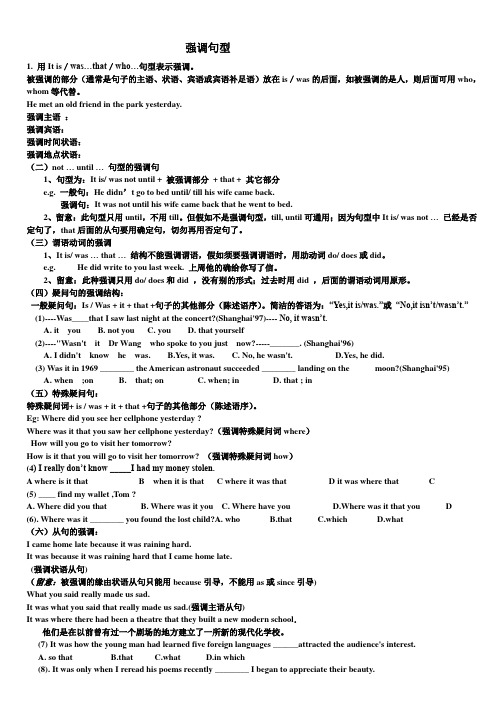
强调句型1. 用It is/was…that/who…句型表示强调。
被强调的部分(通常是句子的主语、状语、宾语或宾语补足语)放在is/was的后面,如被强调的是人,则后面可用who,whom等代替。
He met an old friend in the park yesterday.强调主语:强调宾语:强调时间状语:强调地点状语:(二)not … until …句型的强调句1、句型为:It is/ was not until + 被强调部分+ that + 其它部分e.g. 一般句:He didn’t go to bed until/ till his wife came back.强调句:It was not until his wife came back that he went to bed.2、留意:此句型只用until,不用till。
但假如不是强调句型,till, until可通用;因为句型中It is/ was not …已经是否定句了,that后面的从句要用确定句,切勿再用否定句了。
(三)谓语动词的强调1、It is/ was … that …结构不能强调谓语,假如须要强调谓语时,用助动词do/ does或did。
e.g. He did write to you last week. 上周他的确给你写了信。
2、留意:此种强调只用do/ does和did ,没有别的形式;过去时用did ,后面的谓语动词用原形。
(四)疑问句的强调结构:一般疑问句:Is / Was + it + that +句子的其他部分(陈述语序)。
简洁的答语为:“Yes,it is/was.”或“No,it isn’t/wasn’t.”(1)----Was____that I saw last night at the concert?(Shanghai'97)---- No, it wasn’t.A. it youB. not youC. youD. that yourself(2)----"Wasn't it Dr Wang who spoke to you just now?-----_______. (Shanghai'96)A. I didn't know he was.B.Yes, it was.C. No, he wasn't.D.Yes, he did.(3) Was it in 1969 ________ the American astronaut succeeded ________ landing on the moon?(Shanghai'95)A. when ;onB. that; onC. when; inD. that ; in(五)特殊疑问句:特殊疑问词+ is / was + it + that +句子的其他部分(陈述语序)。
高中英语语法总结:强调句
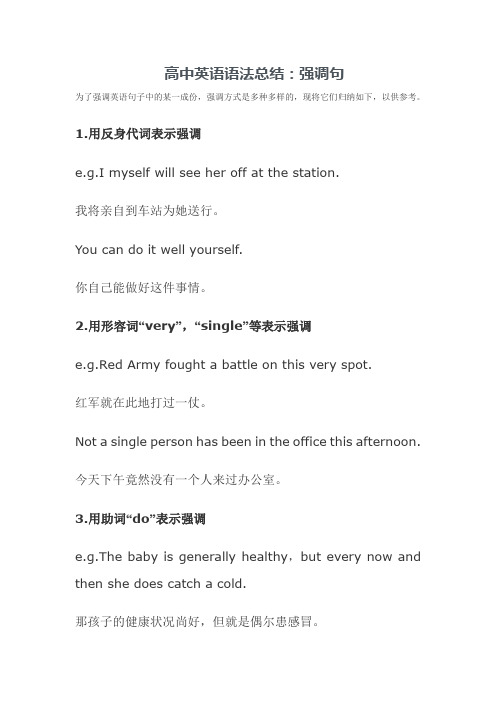
高中英语语法总结:强调句为了强调英语句子中的某一成份,强调方式是多种多样的,现将它们归纳如下,以供参考。
1.用反身代词表示强调e.g.I myself will see her off at the station.我将亲自到车站为她送行。
You can do it well yourself.你自己能做好这件事情。
2.用形容词“very”,“single”等表示强调e.g.Red Army fought a battle on this very spot.红军就在此地打过一仗。
Not a single person has been in the office this afternoon.今天下午竟然没有一个人来过办公室。
3.用助词“do”表示强调e.g.The baby is generally healthy,but every now and then she does catch a cold.那孩子的健康状况尚好,但就是偶尔患感冒。
Do be quiet.I told you I had a headache.务必安静,我告诉过你,我头疼。
4.用副词“very”,“only”,“even”,“too”等表示强调e.g.He drank it to the very last drop.他把它喝得一干二净。
Only in this way can we wipe out the enemy troops.只有用这样的方法我们才能消灭敌军。
He didn't answer even my letter.他甚至连我的信都未回。
I will too go!我要去的!5.用“...and that”,“...and those”,“not...too much”,“否定加否定”等结构表示强调e.g.They fulfilled the task,and that in a few days.他们在几天内完成的就是那项任务。
高中英语知识点归纳强调句的构成与用法
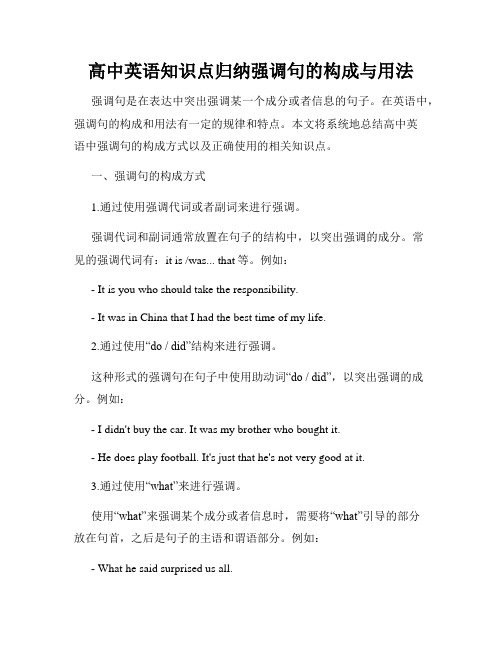
高中英语知识点归纳强调句的构成与用法强调句是在表达中突出强调某一个成分或者信息的句子。
在英语中,强调句的构成和用法有一定的规律和特点。
本文将系统地总结高中英语中强调句的构成方式以及正确使用的相关知识点。
一、强调句的构成方式1.通过使用强调代词或者副词来进行强调。
强调代词和副词通常放置在句子的结构中,以突出强调的成分。
常见的强调代词有:it is /was... that等。
例如:- It is you who should take the responsibility.- It was in China that I had the best time of my life.2.通过使用“do / did”结构来进行强调。
这种形式的强调句在句子中使用助动词“do / did”,以突出强调的成分。
例如:- I didn't buy the car. It was my brother who bought it.- He does play football. It's just that he's not very good at it.3.通过使用“what”来进行强调。
使用“what”来强调某个成分或者信息时,需要将“what”引导的部分放在句首,之后是句子的主语和谓语部分。
例如:- What he said surprised us all.- What I want is a peaceful life.二、强调句的用法1.强调句常用于口语中,以突出特定的信息,使得交流更加明确和清晰。
在日常生活中,我们经常使用强调句来表达重要的信息,或者强调某个成分在句子中的重要性。
通过使用强调句,我们可以让对方更加明确地理解我们想要表达的意思。
2.强调句在写作中也经常被应用,以突出某个特定的信息,使文章更加有力和引人注目。
在写作中,我们可以使用强调句来让读者更加关注我们想要表达的核心信息。
高三英语强调句
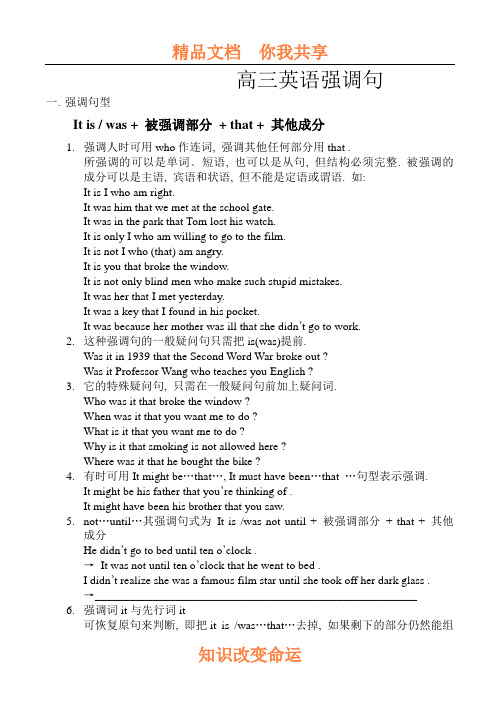
高三英语强调句一.强调句型It is / was + 被强调部分+ that + 其他成分1.强调人时可用who作连词, 强调其他任何部分用that .所强调的可以是单词﹑短语, 也可以是从句, 但结构必须完整. 被强调的成分可以是主语, 宾语和状语, 但不能是定语或谓语. 如:It is I who am right.It was him that we met at the school gate.It was in the park that Tom lost his watch.It is only I who am willing to go to the film.It is not I who (that) am angry.It is you that broke the window.It is not only blind men who make such stupid mistakes.It was her that I met yesterday.It was a key that I found in his pocket.It was because her mother was ill that she didn’t go to work.2.这种强调句的一般疑问句只需把is(was)提前.Was it in 1939 that the Second Word War broke out ?Was it Professor Wang who teaches you English ?3.它的特殊疑问句, 只需在一般疑问句前加上疑问词.Who was it that broke the window ?When was it that you want me to do ?What is it that you want me to do ?Why is it that smoking is not allowed here ?Where was it that he bought the bike ?4.有时可用It might be…that…, It must have been…that …句型表示强调.It might be his father that you’re thinking of .It might have been his brother that you saw.5.not…until…其强调句式为It is /was not until + 被强调部分+ that + 其他成分He didn’t go to bed until ten o’clock .→It was not until ten o’clock that he went to bed .I didn’t realize she was a famous film star until she took off her dark glass .→________________________________________________________6.强调词it与先行词it可恢复原句来判断, 即把it is /was…that…去掉, 如果剩下的部分仍然能组成一个完整的句子, 这就是强调句型, 否则就不是.It is there that accidents often happen .→_________________________________________It is clear that not all boys like football .→_________________________________________________ .7.强调句型It was /is…that…; It was /is + 时间+ when从句;It is + 时间+ since从句; It was not long …before…①强调句型与It is /was + 时间+ when从句在上述句型中it指时间, when引导的是时间状语从句. 注意两种“时间”的表达方式的不同.It was at night that I got back home yesterday .It was midnight when I got here yesterday .②强调句型与It is+ 时间+ since从句It is …since…表示“自从……以来已有……(时间)”注意两个句型中的时态一般不同.It was two years ago that I began to learn English .It is two years since I began to learn EnglishIt is two years that he spends on English every day .③强调句型与It was not long…before …从句上述句型可有以下几个句式:It was not long before …It won’t be long before …It was (not) two years /days/ …before …It will (not) be two years/days before…It was two years before he came back from abroad .It was two years later that he came back from abroad .二.谓语动词的强调It is /was …that …结构不能强调谓语, 如果需要强调谓语时, 用助动词do , did或does.Do come this evening .He did write to you last week .Tom does study hard now.三.强调句式The + 名词+be + that从句/wh-从句/不定式/名词词组The problem is that she doesn’t like traveling .The conclusion is to take action at once .The answer is reforming and furthering development . 沁园春·雪 <毛泽东>北国风光,千里冰封,万里雪飘。
高三英语强调句结构单选题30题
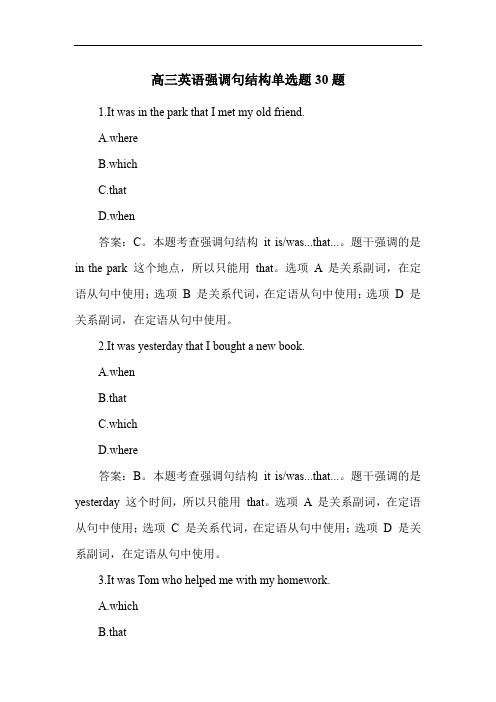
高三英语强调句结构单选题30题1.It was in the park that I met my old friend.A.whereB.whichC.thatD.when答案:C。
本题考查强调句结构it is/was...that...。
题干强调的是in the park 这个地点,所以只能用that。
选项A 是关系副词,在定语从句中使用;选项B 是关系代词,在定语从句中使用;选项D 是关系副词,在定语从句中使用。
2.It was yesterday that I bought a new book.A.whenB.thatC.whichD.where答案:B。
本题考查强调句结构it is/was...that...。
题干强调的是yesterday 这个时间,所以只能用that。
选项A 是关系副词,在定语从句中使用;选项C 是关系代词,在定语从句中使用;选项D 是关系副词,在定语从句中使用。
3.It was Tom who helped me with my homework.A.whichB.thatC.whoD.whom答案:C。
本题考查强调句结构it is/was...who...。
题干强调的是Tom 这个人,当强调的是人且在句中作主语时,用who。
选项A 是关系代词,在定语从句中使用;选项B 在强调句中可以用,但本题强调的是人且作主语,所以用who 更合适;选项D 是关系代词,在定语从句中使用,且在从句中作宾语。
4.It was at the library that I found the book.A.whereB.thatC.whichD.when答案:B。
本题考查强调句结构it is/was...that...。
题干强调的是at the library 这个地点,所以只能用that。
选项A 是关系副词,在定语从句中使用;选项C 是关系代词,在定语从句中使用;选项D 是关系副词,在定语从句中使用。
高中英语2023高考强调句专题复习(强调成分+考点分析)
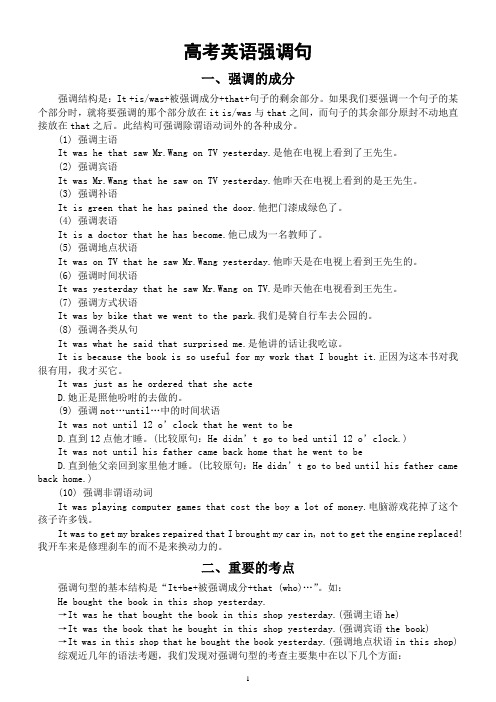
高考英语强调句一、强调的成分强调结构是:It +is/was+被强调成分+that+句子的剩余部分。
如果我们要强调一个句子的某个部分时,就将要强调的那个部分放在it is/was与that之间,而句子的其余部分原封不动地直接放在that之后。
此结构可强调除谓语动词外的各种成分。
(1) 强调主语It was he that saw Mr.Wang on TV yesterday.是他在电视上看到了王先生。
(2) 强调宾语It was Mr.Wang that he saw on TV yesterday.他昨天在电视上看到的是王先生。
(3) 强调补语It is green that he has pained the door.他把门漆成绿色了。
(4) 强调表语It is a doctor that he has become.他已成为一名教师了。
(5) 强调地点状语It was on TV that he saw Mr.Wang yesterday.他昨天是在电视上看到王先生的。
(6) 强调时间状语It was yesterday that he saw Mr.Wang on TV.是昨天他在电视看到王先生。
(7) 强调方式状语It was by bike that we went to the park.我们是骑自行车去公园的。
(8) 强调各类从句It was what he said that surprised me.是他讲的话让我吃谅。
It is because the book is so useful for my work that I bought it.正因为这本书对我很有用,我才买它。
It was just as he ordered that she acteD.她正是照他吩咐的去做的。
(9) 强调not…until…中的时间状语It was not until 12 o’clock that he went to beD.直到12点他才睡。
高三英语强调句型单选题30题
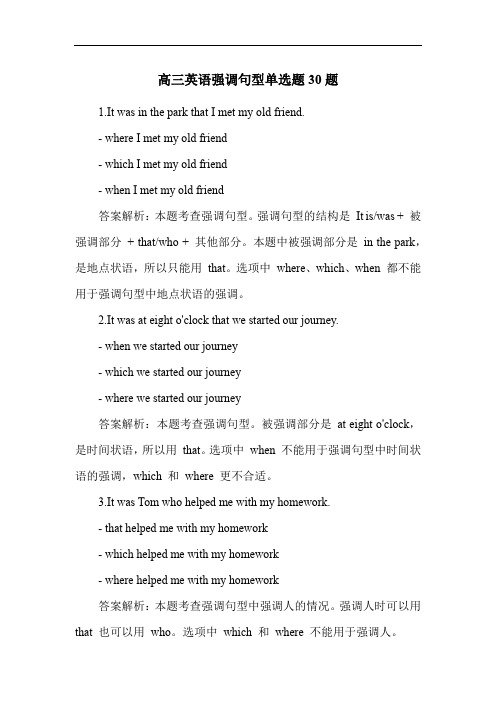
高三英语强调句型单选题30题1.It was in the park that I met my old friend.- where I met my old friend- which I met my old friend- when I met my old friend答案解析:本题考查强调句型。
强调句型的结构是It is/was + 被强调部分+ that/who + 其他部分。
本题中被强调部分是in the park,是地点状语,所以只能用that。
选项中where、which、when 都不能用于强调句型中地点状语的强调。
2.It was at eight o'clock that we started our journey.- when we started our journey- which we started our journey- where we started our journey答案解析:本题考查强调句型。
被强调部分是at eight o'clock,是时间状语,所以用that。
选项中when 不能用于强调句型中时间状语的强调,which 和where 更不合适。
3.It was Tom who helped me with my homework.- that helped me with my homework- which helped me with my homework- where helped me with my homework答案解析:本题考查强调句型中强调人的情况。
强调人时可以用that 也可以用who。
选项中which 和where 不能用于强调人。
4.It was the book that he bought yesterday.- which he bought yesterday- when he bought yesterday- where he bought yesterday答案解析:本题考查强调句型。
高中英语强调句作文
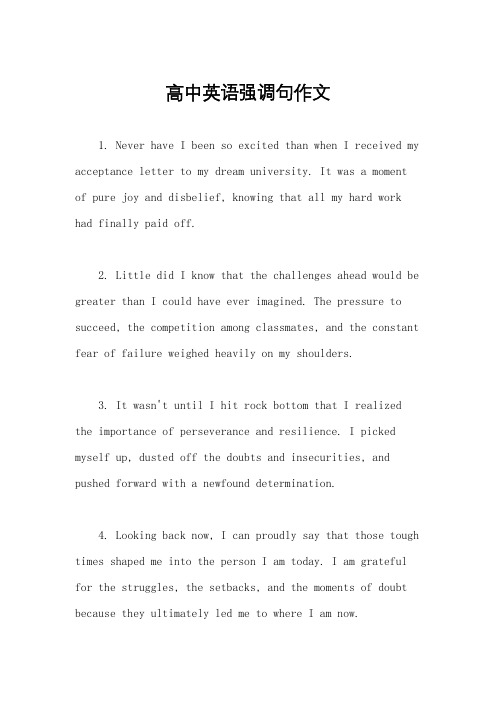
高中英语强调句作文1. Never have I been so excited than when I received my acceptance letter to my dream university. It was a moment of pure joy and disbelief, knowing that all my hard work had finally paid off.2. Little did I know that the challenges ahead would be greater than I could have ever imagined. The pressure to succeed, the competition among classmates, and the constant fear of failure weighed heavily on my shoulders.3. It wasn't until I hit rock bottom that I realized the importance of perseverance and resilience. I picked myself up, dusted off the doubts and insecurities, and pushed forward with a newfound determination.4. Looking back now, I can proudly say that those tough times shaped me into the person I am today. I am grateful for the struggles, the setbacks, and the moments of doubt because they ultimately led me to where I am now.5. So, to all the high school students out there facing their own battles, remember this: the road to success is never easy, but it is worth every obstacle and every tear shed along the way. Believe in yourself, stay true to your dreams, and never give up, no matter how tough it may seem.。
高三英语强调句型单选题40题
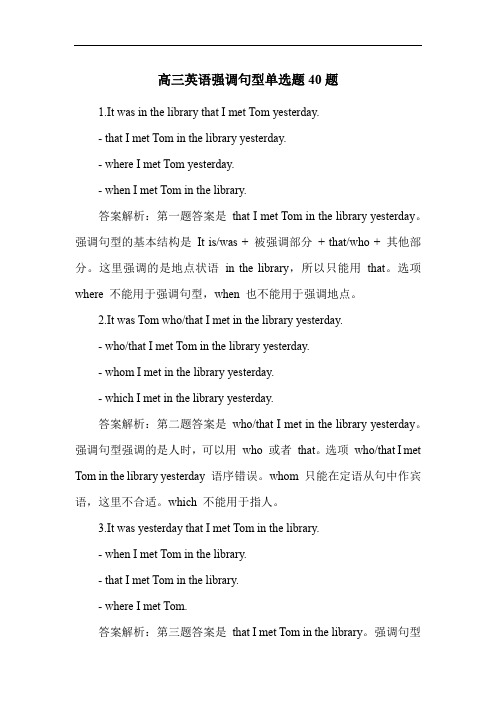
高三英语强调句型单选题40题1.It was in the library that I met Tom yesterday.- that I met Tom in the library yesterday.- where I met Tom yesterday.- when I met Tom in the library.答案解析:第一题答案是that I met Tom in the library yesterday。
强调句型的基本结构是It is/was + 被强调部分+ that/who + 其他部分。
这里强调的是地点状语in the library,所以只能用that。
选项where 不能用于强调句型,when 也不能用于强调地点。
2.It was Tom who/that I met in the library yesterday.- who/that I met Tom in the library yesterday.- whom I met in the library yesterday.- which I met in the library yesterday.答案解析:第二题答案是who/that I met in the library yesterday。
强调句型强调的是人时,可以用who 或者that。
选项who/that I met Tom in the library yesterday 语序错误。
whom 只能在定语从句中作宾语,这里不合适。
which 不能用于指人。
3.It was yesterday that I met Tom in the library.- when I met Tom in the library.- that I met Tom in the library.- where I met Tom.答案解析:第三题答案是that I met Tom in the library。
英语的强调句型

英语的强调句型有以下这些:
1. It is/was + 被强调部分+ that/who + 句子其余部分。
例如:It was John who won the singing competition.
翻译:是约翰赢得了唱歌比赛。
2. What/How + 被强调部分+ 句子其余部分。
例如:What a beautiful sunset it is!
翻译:多美的日落啊!
3. Not only + 助动词/情态动词+ 主语+ 谓语,but also + 强调部分。
例如:Not only did she pass the exam, but she also got the highest score. 翻译:她不仅通过了考试,而且还获得了最高分。
4. 虚拟形式的强调句型:
If only + 主语+ 过去式,(then) + 结果。
例如:If only I had studied harder, I would have passed the test.
翻译:要是我当时学得更努力就好了,我就能通过那次考试了。
这些强调句型可以帮助我们在表达中有效地突出某个信息。
请注意,具体使用哪种强调句型取决于语境和强调的对象。
高考英语-强调句

She didn’t mention her summer plan until near the end of the letter. = It was not until near the end of the letter that she mentioned her summer plan.
以下四个句子是强调句吗?
It is there that accidents often happen. It was at midnight that I got back home yesterday.
It was two years ago that I began to learn English.
强调句的基本结构
2. 有时可用It might be…that/who…, it must have been…that/who…表示强调。意为“可能是……”、 “一定是……” It might be his father that/who you’re thinking of. It must have been his brother that/who you saw in the museum.
强调句的基本结构
3. not…until…句型的强调句式为:It is/was not until + 被强调部分 + that +其他成分。 He didn’t go to bed until ten o’clock. = It was not until ten o’clock that he went to bed.
下面的活动是:看图造强调句 ^.^
Well down!
高中英语•强调句
目录
1
强调句基本结构
强调句(完整版)_高三英语

从句,只能由because引导,不 能由since、as或why引导。
It was because the water had
risen that they could not cross
the river. 正是由于水涨了,他们没有渡
过河去。 2021/10/10
22
3.注意 " not ... until " 强调句 型的变化。
A. there were B. it were C.
there was D. it was
2021/10/10
32
II.句型转换 改写下列各句,
1. Bill made a kite at school yesterday.
2. John sells potatoes.
3. The mother loves her baby
A.which B. when B.C. that D. since
2021/10/10
29
3. She said she would go and she ________ go.
A. didn’t B. did C. really D. would
2021/10/10
30
4. It was the training _____ he had as a young man _____ made him such a good engineer.
2021/10/10
20
区分下例两句:
It was 7 o’clock when he came
back. 他回来时7点钟了 .
It was at 7 o’clock that he
came back.
高三英语强调句单选题40题

高三英语强调句单选题40题1.It was Tom who broke the window.Tom broke the window.It was not Jack who broke the window.It was not Jerry who broke the window.答案:第一个选项。
本题考查强调句结构it is/was...who...强调主语。
强调句结构中被强调部分是人时可以用who,此句强调主语Tom,所以正确答案是第一个选项。
后两个选项被强调的人错误,第二个选项只是普通的陈述句不是强调句。
2.It is Mary that we should thank for helping us.We should thank Mary for helping us.It is not Lucy that we should thank for helping us.It is not Lily that we should thank for helping us.答案:第一个选项。
本题考查强调句结构it is/was...that...强调宾语。
强调句结构中被强调部分是事物或人时可以用that,此句强调宾语Mary,所以正确答案是第一个选项。
后两个选项被强调的人错误,第二个选项只是普通的陈述句不是强调句。
3.It was in the park that I met her.I met her in the park.It was not in the zoo that I met her.It was not in the library that I met her.答案:第一个选项。
本题考查强调句结构it is/was...that...强调地点状语。
强调句结构中被强调部分是地点状语时可以用that,此句强调地点状语in the park,所以正确答案是第一个选项。
后两个选项被强调的地点错误,第二个选项只是普通的陈述句不是强调句。
高考英语语法——强调句(共12张PPT)

强调句用于感叹句中
What a silly mistake it is that you have made!
12
10
被强调的名词或代词可带有一个定语从句
Was it Bill, who plays football well, that helped the blind man cross the road? It was in the school, where I once studied, that we hold a party. Was it in the house, which we visited last year, that the murder happened?
时间状语从句、原因状语从句
4
Was it they that (who) would get married? It was not they that (who) would get married.
5
What was it that I had done? Who was it that did it? When is it that the train will draw out of the station? How is it that you find the key? Why was it that you talk back to your parents?
2
3
主语 宾语 宾补 状语
It is what you said that makes her angry. It was our English teacher whom we invited to take part in our party. It is yellow that the workers paint the wall. It was because it rained heavily that we couldn't hold the sports meet.
高中英语高考复习基础语法强调句知识讲解

高中英语强调句为了强调、突出某种意思,为了强调句子的某一部分,会用到强调结构。笼统的说,强调结构可以分为口语和书面语两种强调结构。一、口语的强调口语中强调比较简单,主要是通过重读来实现的。如下句:Tom never goes to the cinema.1) 要强调Tom而不是别人从不去影院,会重读TOM,从而形成'TOM never goes to the cinema.2) 要强调Tom从不去影院,而不是去其他地方,会重读the CINEMA,从而形成Tom never goes to the 'CINEMA.1) 而要强调Tom从不NEVER去影院,会重读NEVER,从而形成TOM 'NEVER goes to the cinema.相对要简单很多。二、书面语的强调一般我们所说的强调,指的是书面语的强调。常用的就是强调句、倒装等一些特殊句式。(一)强调句句型的种类及句型⒈ 陈述句的强调句型:It is/ was + 被强调部分(通常是主语、宾语或状语)+ that/ who(当强调主语且主语指人)+ 其他部分。如:It was yesterday that he met Li Ping.⒉ 一般疑问句的强调句型:同上,只是把is/ was提到it前面。如:Was it yesterday that he met Li Ping?⒊ 特殊疑问句的强调句型:被强调部分(通常是疑问代词或疑问副词)+ is/ was + it + that/ who + 其他部分?如:When and where was it that you were born?⒋ 强调句例句:针对I met Li Ming at the railway station yesterday.句子进行强调。① 强调主语:It was I that (who) met Li Ming at the railway station yesterday.② 强调宾语:It was Li Ming that I met at the railway station yesterday.③ 强调地点状语:It was at the railway station that I met Li Ming yesterday.④ 强调时间状语:It was yesterday that I met Li Ming at the railway station.⑤注意:构成强调句的it本身没有词义;强调句中的连接词一般只用that、who,即使在强调时间状语和地点状语时也如此,that, who不可省略;强调句中的时态只用两种,一般现在时和一般过去时。原句谓语动词是一般过去时、过去完成时和过去进行时,用It was…,其余的时态用It is…(二)not … until … 句型的强调句⒈ 句型为:It is/ was not until + 被强调部分 + that + 其他部分如:普通句:He didn't go to bed until/ till his wife came back.如:强调句:It was not until his wife came back that he went to bed.⒉ 注意:此句型只用until,不用till。但如果不是强调句型,till, until可通用;因为句型中It is/ was not …… 已经是否定句了,that后面的从句要用肯定句,切勿再用否定句了。(三)谓语动词的强调⒈ It is/ was …… that …… 结构不能强调谓语,如果需要强调谓语时,用助动词do/ does 或did.如:Do sit down. 务必请坐。He did write to you last week. 上周他确实给你写了信。Do be careful when you cross the street. 过马路时,务必(千万)要小心啊!⒉ 注意:此种强调只用do/ does和did,没有别的形式;过去时用did,后面的谓语动词用原形。
强调句典型例句100句

强调句典型例句100句强调句是英语中非常重要的语法结构之一,它可以用来强调某个句子成分的重要性或者突出某个观点的重要性。
在英语中,强调句常常使用倒装句和强调副词来表达。
下面是100个典型的强调句例句,希望对大家的英语学习有所帮助。
1. It was John who stole the money.(强调主语)2. It is the teacher who makes the difference in education.(强调主语)3. It was in Paris where I met my wife.(强调地点状语)4. It is only after we have lost everything that we are free to do anything.(强调时间状语)5. It was not until I met him that I realized how muchI loved him.(强调时间状语)6. It was in the library that I found the book.(强调地点状语)7. It was on the top of the mountain that we saw the sunrise.(强调地点状语)8. It was not until I got home that I realized I had left my keys in the office.(强调时间状语)9. It was only when I saw the movie that I understood the book.(强调时间状语)10. It is the little things that count.(强调宾语)11. It is the people who make the difference.(强调主语)12. It was the best party I have ever been to.(强调宾语)13. It is not what you say, but how you say it.(强调宾语)14. It is not what you know, but who you know.(强调宾语)15. It was not the answer I was looking for.(强调宾语)16. It was the worst day of my life.(强调宾语)17. It is not until you lose everything that yourealize what you had.(强调宾语)18. It is only when you are alone that you can truly be yourself.(强调宾语)19. It is not how much you have, but how much you enjoy that makes you happy.(强调宾语)20. It was the most beautiful sunset I have ever seen.(强调宾语)21. It is not what you do, but how you do it that matters.(强调宾语)22. It was the most delicious meal I have ever had.(强调宾语)23. It is not what you wear, but how you wear it that makes you stylish.(强调宾语)24. It was the most exciting game I have ever watched.(强调宾语)25. It is not where you go, but who you go with that makes the trip memorable.(强调宾语)26. It was the scariest movie I have ever seen.(强调宾语)27. It is not what you have, but what you give that defines you.(强调宾语)28. It was the longest journey I have ever taken.(强调宾语)29. It is not what you achieve, but how you achieve it that matters.(强调宾语)30. It was the most challenging project I have ever worked on.(强调宾语)31. It is not what you say, but what you do that counts.(强调宾语)32. It was the most difficult decision I have ever made.(强调宾语)33. It is not what you have, but what you do with whatyou have that matters.(强调宾语)34. It was the most important lesson I have ever learned.(强调宾语)35. It is not what you have, but who you are that matters.(强调宾语)36. It was the most inspiring speech I have ever heard.(强调宾语)37. It is not what you take, but what you leave behind that counts.(强调宾语)38. It was the most memorable vacation I have ever had.(强调宾语)39. It is not what you gain, but what you give up that defines you.(强调宾语)40. It was the most romantic evening I have ever had.(强调宾语)41. It is not what you earn, but how you earn it that matters.(强调宾语)42. It was the most satisfying meal I have ever had.(强调宾语)43. It is not what you receive, but what you give that makes you rich.(强调宾语)44. It was the most touching story I have ever heard.(强调宾语)45. It is not what you have, but what you do that defines you.(强调宾语)46. It was the most wonderful experience I have ever had.(强调宾语)47. It is not what you get, but what you give that matters.(强调宾语)48. It was the most amazing sight I have ever seen.(强调宾语)49. It is not what you have, but what you share that makes you happy.(强调宾语)50. It was the most beautiful wedding I have ever attended.(强调宾语)51. It is not what you believe, but how you act on your beliefs that matters.(强调宾语)52. It was the most breathtaking view I have ever seen.(强调宾语)53. It is not what you have, but what you do with what you have that counts.(强调宾语)54. It was the most challenging obstacle I have ever faced.(强调宾语)55. It is not what you know, but how you apply what youknow that matters.(强调宾语)56. It was the most difficult test I have ever taken.(强调宾语)57. It is not what you say, but how you say it that matters.(强调宾语)58. It was the most exciting adventure I have ever had.(强调宾语)59. It is not what you have, but who you are that counts.(强调宾语)60. It was the most important decision I have ever made.(强调宾语)61. It is not what you do, but why you do it that matters.(强调宾语)62. It was the most memorable moment I have ever experienced.(强调宾语)63. It is not what you have, but what you give that makes you rich.(强调宾语)64. It was the most rewarding experience I have ever had.(强调宾语)65. It is not what you say, but what you do that defines you.(强调宾语)66. It was the most satisfying job I have ever had.(强调宾语)67. It is not what you have, but what you do with it that counts.(强调宾语)68. It was the most surprising news I have ever heard.(强调宾语)69. It is not what you have, but what you do that makes you happy.(强调宾语)70. It was the most unusual experience I have ever had.(强调宾语)71. It is not what you have, but what you do that matters.(强调宾语)72. It was the most wonderful feeling I have ever experienced.(强调宾语)73. It is not what you have, but what you do with what you have that counts.(强调宾语)74. It was the most beautiful painting I have ever seen.(强调宾语)75. It is not what you have, but what you do that defines you.(强调宾语)76. It was the most challenging task I have ever undertaken.(强调宾语)77. It is not what you have, but what you do that makesa difference.(强调宾语)78. It was the most exciting event I have ever attended.(强调宾语)79. It is not what you have, but what you do that makes you successful.(强调宾语)80. It was the most important experience I have ever had.(强调宾语)81. It is not what you have, but what you do that makes you great.(强调宾语)82. It was the most meaningful conversation I have ever had.(强调宾语)83. It is not what you have, but what you give that makes you valuable.(强调宾语)84. It was the most powerful speech I have ever heard.(强调宾语)85. It is not what you have, but what you do that makes you extraordinary.(强调宾语)86. It was the most satisfying experience I have ever had.(强调宾语)87. It is not what you have, but what you do that makes you special.(强调宾语)88. It was the most significant event I have ever beena part of.(强调宾语)89. It is not what you have, but what you do that makes you unique.(强调宾语)90. It was the most valuable lesson I have ever learned.(强调宾语)91. It is not what you have, but what you do that makes you important.(强调宾语)92. It was the most challenging experience I have ever had.(强调宾语)93. It is not what you have, but what you do that makes you admirable.(强调宾语)94. It was the most enriching experience I have ever had.(强调宾语)95. It is not what you have, but what you do that makes you successful.(强调宾语)96. It was the most fulfilling experience I have ever had.(强调宾语)97. It is not what you have, but what you do that makes you happy.(强调宾语)98. It was the most life-changing experience I have ever had.(强调宾语)99. It is not what you have, but what you do that makesyou fulfilled.(强调宾语)100. It was the most transformational experience I have ever had.(强调宾语)总之,强调句在英语中是一种非常重要的语法结构,可以用来强调句子成分的重要性或者突出某个观点的重要性。
- 1、下载文档前请自行甄别文档内容的完整性,平台不提供额外的编辑、内容补充、找答案等附加服务。
- 2、"仅部分预览"的文档,不可在线预览部分如存在完整性等问题,可反馈申请退款(可完整预览的文档不适用该条件!)。
- 3、如文档侵犯您的权益,请联系客服反馈,我们会尽快为您处理(人工客服工作时间:9:00-18:30)。
高三英语强调句1. 强调句的定义强调是有效地进行思想交流的重要手段之一。
人们在交际过程中,为了使自己的思想能为听者或读者恰当的理解,必须突出重要的内容,这就需要运用强调的手段。
2. 强调的构成在现代英语中,人们可以通过语音手段、词汇手段、语法手段来进行强调。
(1) 语音手段在口语中,人们可以根据交流的需要,通过语句重音来对不同的词语进行强调。
例如He speaks English well 这句话,可以通过语句重音来分别对不同的词进行强调:A: We need a good student to host the evening party.B: Well, he speaks English well. (侧重“他”)A: He’s been living in Canada for years.B: He speaks English well but his writing is not very good. (侧重“说”)A: He speaks fluent French.B: He speaks English well, too. (侧重“英语”)A: Do you think he is fit for the job?B: Certainly. He speaks English well. (侧重“好”)(2) 词汇手段人们常用一些形容词、副词、否定词等词汇手段来较强语气。
例如:This is a most interesting TV play. 这是一部非常有趣的电视剧。
Grace is tall, but Catherine is still taller. 格雷斯个子很高,但是凯瑟林个子更高。
War and peace is the best novel that l have ever read.《战争与和平》是我曾经读过的最好小说。
The last thing that a lazy student wishes is examination. 懒学生最不愿意的事情就是考试。
At that very moment the policemen came. 就在那时警察到了。
I can't even remember the name of that old friend of mine. 我甚至连那位老朋友的名字都不记得了。
Where in the world did you go just now ? 你刚才究竟去哪儿了?What on earth are you doing? 你究竟在干什么?She's not in the least angry with me. 她一点也不生我的气。
The president himself will chare the meeting. 总统将亲自主持这个会议。
(反身代词作主语同位语表示强调)(3) 语法手段1. 用It is/was…that/who…句型表示强调。
被强调的部分(通常是句子的主语、状语、宾语或宾语补足语)放在is/was的后面,如被强调的是人,则后面可用who,whom等代替。
例如:He met an old friend in the park yesterday. 他昨天在公园碰见一个老朋友。
上述句子可以通过强调句型对除谓语以外的不同成分进行强调。
如:It was he who/that met an old friend in the park yesterday. (强调主语)It was an old friend that/who he met in the park yesterday. (强调宾语)It was in the park that he met an old friend yesterday. (强调地点状语)It was yesterday that he met an old friend in he park. (强调时间状语)2. 用助动词do, does或did来强调谓语动词。
例如:Do come early. 一定早点来。
He did send you a letter last week. 他上周确实给你寄过一封信。
We’re pleased that she does intend to come. 她的确打算来,我们非常高兴。
3.用主语从句+BE+被强调部分,主语从句常用what引导。
例如:John wants a ball. 约翰想要一个球。
What John wants is a ball. 约翰想要的是一个球。
Mary gives piano lessons every day. 玛丽每天教钢琴。
What Mary does every day is (to) give piano lessons. 玛丽每天干的工作是教钢琴。
4. 用修辞疑问句,表示强调。
疑问句转用作加强语气的陈述句时,即可称为修辞性疑问句。
需要注意的是:肯定的修辞疑问句其意义相当于强调的否定陈述句;而否定的修辞疑问句其意义则相当于强调的肯定陈述句。
如:Can anyone doubt the truth of his statement? 谁能怀疑他陈述的真实性?(=Surely no one can / would doubt it.)Who doesn't know the sun rises in the east? 谁不知道太阳从东方升起?(=Everyone knows…)5 人们还可以通过改变句子结构或颠倒正常语气的手段来进行强调。
例如:Never will China be the first to use nuclear weapons. 中国决不会第一个使用核武器。
Only in this way can we catch up with and surpass the world's advanced level of science and technology. 只有这样,我们才能赶上并超过世界先进科技水平。
Happy are those who are content. 知足常乐。
1. It is/was…that… 强调句型的强调部分必须是对that / who 之后句子的某一成分表示强调,如果把"It is (was)...that "去掉,该句应该意思完整,不缺任何句子成分。
区分下例两句:It was 7 o’clock when he came back. 他回来时7点钟了。
(it指时间)It was at 7 o’clock that he came back. 他是7点钟回来的。
(强调句,强调at 7 o’clock)2. It is/was…that…强调句型的被强调部分如果是原因状语从句,只能由because引导,不能由since、as或why引导。
例如:It was because the water had risen that they could not cross the river. 正是由于水涨了,他们没有渡过河去。
(不用because或since)3.注意" not ... until " 强调句型的变化。
比较下列三个句子:She didn't remember her appointment with the doctor until she had arrived home.It was not until she had arrived home that she remembered her appointment with the doctor.Not until she had arrived home did she remember her appointment with the doctor.4. It is/was…that…强调句型中,that作宾语时可以省略,例如:It was a new dictionary (that) Father bought for me. 父亲给我买的是一本新字典。
Was it her (that) you were talking about? 你刚才是和她在谈话吗?1. It is/was…that… 强调句型的强调部分必须是对that / who 之后句子的某一成分表示强调,如果把"It is (was)...that "去掉,该句应该意思完整,不缺任何句子成分。
区分下例两句:It was 7 o’clock when he came back. 他回来时7点钟了。
(it指时间)It was at 7 o’clock that he came back. 他是7点钟回来的。
(强调句,强调at 7 o’clock)2. It is/was…that…强调句型的被强调部分如果是原因状语从句,只能由because引导,不能由since、as或why引导。
例如:It was because the water had risen that they could not cross the river. 正是由于水涨了,他们没有渡过河去。
(不用because或since)3.注意" not ... until " 强调句型的变化。
比较下列三个句子:She didn't remember her appointment with the doctor until she had arrived home.It was not until she had arrived home that she remembered her appointment with the doctor.Not until she had arrived home did she remember her appointment with the doctor.4. It is/was…that…强调句型中,that作宾语时可以省略,例如:It was a new dictionary (that) Father bought for me. 父亲给我买的是一本新字典。
Was it her (that) you were talking about? 你刚才是和她在谈话吗?5. 如果强调的是特殊疑问句,要用“特殊疑问词+is/was + it + that +…”结构,表示“究竟是谁……,到底在哪里……”等等。
例如:Who was it that you want to see? 你究竟想见谁?Where was it that you saw the teacher? 你到底在哪里看见老师的?Why is it that you want to change your mind? 你究竟为什么要改变主意?I.单项选择从A、B、C、D四个选项中,选出可以填入空白处的最佳答案:1. It _____ Mike and Mary who helped the old man several days ago .A. wasB. areC. wereD. had been2. It was not until 1920 _____ regular radio broadcasts began.A. whichB. whenC. thatD. since3. She said she would go and she ________ go.A. didn’tB. didC. reallyD. would4. It was the training _____ he had as a young man _____ made him such a good engineer.A. what; thatB. that; whatC. that; whichD. which; that5. --- Were all three people in the car injured in the accident?--- No, ______ only the two passengers who got hurt.A. there wereB. it wereC. there wasD. it wasII.句型转换改写下列各句,强调黑体字部分:1. Bill made a kite at school yesterday.2. John sells potatoes.3. The mother loves her baby dearly.4. I painted the door white.5. She left her gloves in your room.6. Mr Smith gave a new pen to me.答案:I. ACBDDII. 1. It was Bill who made a kite at school yesterday.2. What John wants is a book.3. The mother does love her baby dearly.4. It was white that I painted the door.5. It was in your room that she left her gloves.6. It was me that Mr Smith gave me a pen to.。
